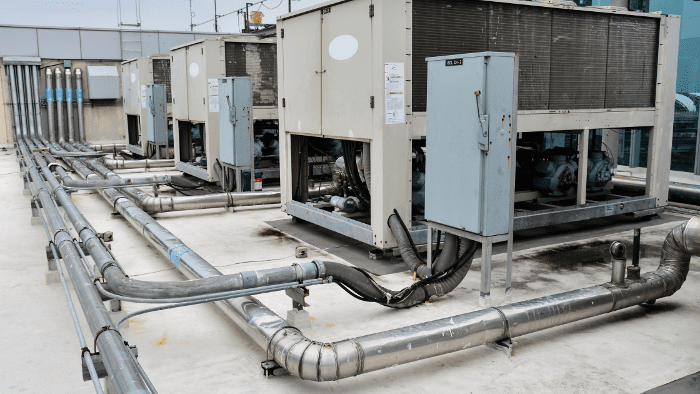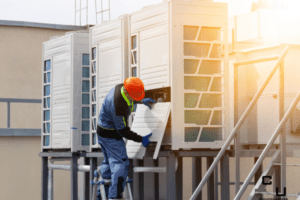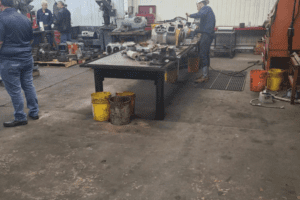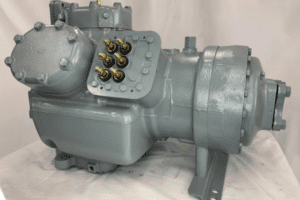If you have read the Compressors Unlimited blog in recent years, you’ve probably seen one of our most common pieces of advice. We always warn our readers not to assume that HVAC problems are caused by the compressor and to check for trouble elsewhere before spending too much time on it.
If your compressor is five years old or younger and it has undergone regular maintenance throughout its service life, it’s very unlikely to be the root cause of any issue. There are exceptions, of course, such as flooding and slugging, which can drive a relatively new compressor to the brink of collapse fast.
Today, we’ll be bucking the trend.
We’re going to talk about a symptom that may indicate compressor problems in your commercial HVAC.
While it’s still more likely than not that there’s an unrelated issue, you should check the compressor first when you notice a loud humming noise. A loud humming noise can be evidence of a malfunction in your compressor, and if you narrow it down to the compressor right away, you can save yourself a lot of time.
We’ll also address the most common alternatives that can cause this kind of humming noise.
The Biggest Reasons Your Commercial HVAC Might Be Humming Loudly
1. The Compressor Is Malfunctioning
The granddaddy of all commercial HVAC problems is a compressor unit failure. The compressor is crucial to the system’s operation, as it pressurizes the refrigerant gas to make it available elsewhere. Without a functional compressor, the loop is broken and the system comes to a complete stop.
A loud humming noise in the compressor can become obvious when the system is loading or unloading. There might be a component failure elsewhere that’s causing the compressor to work harder beyond its tolerances. In the worst case scenario, humming can be so loud it shakes the unit’s housing.
Shut down the HVAC system and run through your compressor maintenance checks for a diagnosis. If there’s no obvious reason for humming, consider talking to a compressor remanufacturing team with experience in your make and model of commercial compressor.
2. The Condenser Fan Motor Is Failing
Dirt and debris can gather on the condenser fan and cause it to stick. In many cases, all you need to do is shut down the system and clean any debris away from the fan blades. If the fan blades are fully cleaned out, but the unit is not running, or not running at full speed, it may still be stuck.
Proceed to the “stick test” by gently poking a stick through the blades and giving the fan a push. If the fan is running unevenly in a way that produces a loud humming noise (indicative of the load no longer distributed evenly), you will need to replace the fan or the motor itself.
3. Damaged Contactor Relay Switch
Loud humming or buzzing noises can be related to electrical faults. If these aren’t dealt with promptly, you can face an elevated risk of electrical fires. One place to check is the contactor relay switch on the outside or rooftop unit. This component switches on high voltage to the exterior unit’s compressor.
Contactor relay switch damage can take several different forms. Any damage is cause for replacement, even if it seems superficial. You might even find that it’s not the cause of your humming noise – but it is still worth the few minutes it takes to put in a new one.
4. Refrigerant Leak
A refrigerant leak can be slow or fast, but it has the telltale result of lukewarm air blowing through the system no matter whether it is set to cool or heat. Use your favorite approach to leak detection, such as a thermal leak detector or fluorescent dye, to get to the bottom of the matter. Remember that your leak can be traceable to the evaporator coil or condenser coil, both of which should be tested individually.
5. Other Electrical Issue
The most serious cause of a loud humming noise is an electrical issue, which may require the help of an outside electrician to isolate. Not only can electrical issues damage your compressor by providing the wrong voltage, but they may also destroy other equipment or even result in fires. If you’re suspicious of your structure’s wiring, a thermal imaging camera can help detect hot spots where old wires are frayed.
Loud Humming May Mean It’s Time to Replace Your Compressor
When humming originates from the compressor, it can indicate damage which means it’s time to replace the unit. No matter the compressor’s age, it’s a wise idea to have a plan in place. With a remanufactured commercial compressor, you’ll get significant savings over the prices set by OEM-affiliated wholesalers.
To preserve your compressor for as long as possible, always take unusual HVAC noises seriously!












